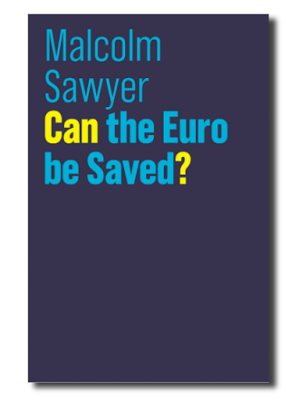Summary:
Malcolm Sawyer is Emeritus Professor of Economics at Leeds University Business SchoolAfter years of crisis and spending cuts, the European Commission is now up to a “sustainable and inclusive growth” (see: Recommendation for the Euro Area, Nov 22, 2017). However, several EUR countries should continue tightening their belts: It calls for further “structural reforms” in order ...
Topics:
Acemaxx-Analytics considers the following as important:
This could be interesting, too:
Malcolm Sawyer is Emeritus Professor of Economics at Leeds University Business SchoolMalcolm Sawyer is Emeritus Professor of Economics at Leeds University Business SchoolAfter years of crisis and spending cuts, the European Commission is now up to a “sustainable and inclusive growth” (see: Recommendation for the Euro Area, Nov 22, 2017). However, several EUR countries should continue tightening their belts: It calls for further “structural reforms” in order ...
Topics:
Acemaxx-Analytics considers the following as important:
This could be interesting, too:
finews.ch writes Vier Luxusresorts für anspruchsvolle Taucherinnen und Taucher
finews.ch writes Franken-Stablecoin-Vereinigung setzt Beirat ein
finews.ch writes Die stille Supermacht: Warum Indien für Investoren zunehmend relevant wird
finews.ch writes Spezielle Premiere an der Schweizer Börse
After years of crisis and spending cuts, the European Commission is now up to a “sustainable and inclusive growth” (see: Recommendation for the Euro Area, Nov 22, 2017).
However, several EUR countries should continue tightening their belts: It calls for further “structural reforms” in order to stimulate investment. Is it possible to boost the economy with fiscal austerity?
Fiscal austerity (reducing public expenditure, raising tax rates) never provides a boost to the economy – it suppresses demand and thereby employment.
An economy will be boosted when there is a revival in demand, whether from investment expenditure, exports or consumer expenditure.
If such a revival in demand occurs, then tax receipts will rise and budget deficit fall. ‘Tightening belts’ inevitably reduces demand, and that will raise unemployment.
A major problem for the Economic and Monetary Union is that countries have signed up to the ‘fiscal compact’ with its requirements for a ‘balanced structural budget’, whether or not that is appropriate for each country.
It is dominated by a belief that a balanced budget is necessary: instead policy should be based on using fiscal policy and budget deficits to balance the economy and underpin full employment.
There is little evidence that ‘structural reforms’, as envisaged by the EC, will encourage investment.
The ‘structural reforms’ which are required are those which will create productive capacity to enable workers to be employed, and which address the current account problems which many countries face.
Given the underemployment of 18% and deflationary bias of policy measures, how is actually EU’s long-standing descent into neoliberalism still justified in Europe?
The political elites, the European Commission and institutions such as the European Central Bank remain strongly committed to a neoliberal agenda for economic policy making: its manifestation are agendas such as the ‘fiscal compact’ with the stress on balanced budgets and on ‘structural reforms’.
The recent Recommendation for the Euro Area is a further illustration with the continued obsession with balanced budget and ‘structural reforms’, used as a euphemism for de-regulation, lowering of social protection, constraining minimum wages etc..
Many elements of neo-liberalism have been embedded in the designs of the European Union, the Economic and Monetary Union etc.: embedded in law and in the institutional policy frameworks:
it could be described as institutionalized neo-liberalism. Making the required political and institutional changes to reverse neo-liberalism becomes close to impossible.
We also have to examine who gains from the neo-liberal agenda and the political power which they have. The experience of the past decade to regard to the financial sector is a good illustration.
Despite the havoc of the financial crisis which came from the behaviour of the financial institutions and markets and despite the mounting evidence of the dysfunctional nature of the financial sector there has been little effect reform of the financial sector and nothing to diminish its power.
The political left continues to be in some disarray and does not present an effective challenge to the neo-liberal agenda. There has been a strange reluctance to challenge the austerity programmes of EMU.
What kind of other obstacles do you see out there to revive Europe’s economic prosperity and to attenuate the social division? EU-leaders proclaim now a Social Pillar. But at once, they want integrate Maastricht Convergence Criteria into EU law.
One major obstacle comes from the construction of the euro area. The euro area can be viewed as a fixed exchange regime with the currency of each of the member countries fixed in value against the other countries.
There have been major current account imbalances between the member countries. Many of the countries which faced large current account deficits in the 2000s have seen their deficits reduced as a result of internal deflation and high unemployment: imports are reduced as a result and the actual current account deficit declines.
But the basic problem remains – namely that if the country concerned was able to return to high level of employment it would be faced by a large current account deficit which would have to be funded by borrowing from outside the country.
In the euro, countries are not able to devalue and change the nominal value of their currency. Countries with the current account deficit constraints will need to build up their export industries through investment, but will be heavily constrained in doing so.
Thank you very much
Malcolm Sawyer is Emeritus Professor of Economics at Leeds University Business School.
His research interests include fiscal policy, financialisation, European single currency and post-Keynesian macro-economics.
His current book “Can the Euro be saved?” is published by Polity Books, 2017.

